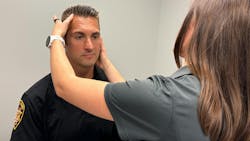Study Looks at Head Injures in Ignored Area: Law Enforcement Officers
Despite the prevalence of concussions among the population, law enforcement officers have been overlooked when it comes to proper treatment, and agencies struggle with providing adequate concussion management guidelines and protocols, according to a study released Monday.
The Ohio State University study, which was published in the Journal of Head Trauma Rehabilitation, found that nearly 75% of Ohio officers surveyed reported sustaining one or more head injuries. More than half of officers also have lost consciousness from an on-duty injury, which can be an indicator of a probable traumatic brain injury. Another troubling finding: Many more of these injuries went unreported than were treated by medical professionals.
“This is an area where we have to improve awareness, just like we did in the sport concussion world,” Dr. Jaclyn Caccese, the study's lead author and an assistant professor in Ohio State University's School of Health and Rehabilitation Sciences at the school's Wexner Medical Center, stated in a press release.
The study went on to report that officers who experienced at least one head injury were 40% more likely to encounter depressive symptoms. They also reported experiencing higher post-traumatic stress disorder (PTSD) symptoms.
Researchers surveyed nearly 400 central Ohio law enforcement officers for the study. Of those, 9% screened positive for PTSD symptoms, while 36% reported mild or greater depressive symptoms. The study also found that roughly fewer than 1 in 4 head injuries was diagnosed or treated by a medical professional.
“The goal is really to improve officer safety and health in the long term,” stated Caccese, who also is an investigator with the university's Chronic Brain Injury Program. “And I think there’s a lot of potential there, especially when it comes to improving career longevity – that although treating these injuries is difficult in the moment, it leads to a longer career, better health outcomes and better quality of life, not only in their service, but also in retirement.”
When it comes to concussion awareness and treatment, law enforcement officers might lack the necessary resources and education, according to the study. Officers' job requirements can also complicate proper concussion management, the study added.
“Sometimes law enforcement officers need to complete the task they’ve set out to do, or it’s not a safe environment to just pull yourself off duty right away. And I think adrenaline sometimes masks concussion symptoms,” Caccese said. “In sports, we’ve been able to increase removal from play, and improve rehabilitation and return-to-play following injury. Hopefully that will improve long-term health outcomes in athletes. We’re trying to get that information translated to the occupational context.”
To combat this, the study's authors published a separate report recommending law enforcement agencies adopt a graduated return-to-duty (RTD) protocol for officers who suffer concussions. These programs would be similar to the guidelines followed by sports teams and the military.
Law enforcement agencies' adoption of these types of proposed RTD protocols is the next step, according to the study's authors.
“Now we have some data that we can present to administrations, to unions, to leadership that says, ‘Here’s the problem. This is how we can fix it. Let’s start working that process,’” Franklin County Sheriff's Deputy Josh Walters, a study coauthor, stated in a press release.

